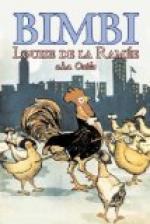“And look at that,” said the gilt Cordovan leather, with a contemptuous glance at a broad piece of gilded leather spread out on a table. “They will sell him cheek by jowl with me, and give him my name; but look! I am overlaid with pure gold beaten thin as a film and laid on me in absolute honesty by worthy Diego de las Gorgias, worker in leather of lovely Cordova in the blessed reign of Ferdinand the Most Christian. His gilding is one part gold to eleven other parts of brass and rubbish, and it has been laid on him with a brush—A brush!—pah! of course he will be as black as a crock in a few years’ time, whilst I am as bright as when I first was made, and, unless I am burnt as my Cordova burnt its heretics, I shall shine on forever.”
“They carve pear wood because it is so soft, and dye it brown, and call it me!” said an old oak cabinet, with a chuckle.
“That is not so painful; it does not vulgarize you so much as the cups they paint to-day and christen after me!” said a Carl Theodor cup subdued in hue, yet gorgeous as a jewel.
“Nothing can be so annoying as to see common gimcracks aping me!” interposed the princess in the pink shoes.
“They even steal my motto, though it is Scripture,” said a Trauerkrug of Regensburg in black-and-white.
“And my own dots they put on plain English china creatures!” sighed the little white maid of Nymphenburg.
“And they sell hundreds and thousands of common china plates, calling them after me, and baking my saints and my legends in a muffle of to-day; it is blasphemy!” said a stout plate of Gubbio, which in its year of birth had seen the face of Maestro Giorgio.
“That is what is so terrible in these bric-a-brac places,” said the princess of Meissen. “It brings one in contact with such low, imitative creatures; one really is safe nowhere nowadays unless under glass at the Louvre or South Kensington.”
“And they get even there,” sighed the gres de Flandre. “A terrible thing happened to a dear friend of mine, a terre cuite of Blasius (you know the terres cuites of Blasius date from 1560). Well, he was put under glass in a museum that shall be nameless, and he found himself set next to his own imitation born and baked yesterday at Frankfort, and what think you the miserable creature said to him, with a grin? ’Old Pipeclay,’—that is what he called my friend,—’the fellow that bought me got just as much commission on me as the fellow that bought you, and that was all that he thought about. You know it is only the public money that goes!’ And the horrid creature grinned again till he actually cracked himself. There is a Providence above all things, even museums.”
“Providence might have interfered before, and saved the public money,” said the little Meissen lady with the pink shoes.
“After all, does it matter?” said a Dutch jar of Haarlem. “All the shamming in the world will not make them us!”




